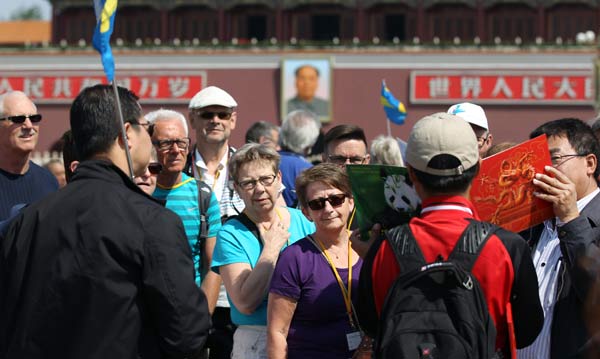 |
|
The number of foreign nationals traveling to China has declined in recent years, with air pollution one of the key causes. ZOU HONG/ CHINA DAILY
|
According to Wu Bihu, director of the Research Center for Tourism Development and Planning at Peking University, the tourist industry in the city has no alternative but to act, and fast: "Beijing can't wait for the air quality to improve before attempting to raise standards in the tourist industry. The city has to promote its tourist attractions right now because cleaning up the air is a long-term issue."
Wu's call is unlikely to fall on deaf ears because the shortfall in visitor numbers has sounded alarm bells within the industry. "In recent years, the number of foreigners traveling to China has definitely declined, resulting in the stagnation or decline of inbound tourism," said Han Yufeng, general manager of the Department of Inbound Tourism at China International Travel Service Ltd.
Economic downturn
The decline comes against a backdrop of financial uncertainty caused by the global economic downturn. People are either unable to afford a vacation overseas or are looking to get more bang for their buck by visiting countries where they can be sure of relatively low prices and clean air.
The effects of the financial crisis have also been exacerbated by a 30 percent rise in the strength of the yuan against the US dollar, which makes traveling within China a less attractive proposition and far more expensive than neighboring countries such as Vietnam, Cambodia and Myanmar, which have taken up the slack and attracted a large number of tourists who would otherwise have visited China, according to Han.
As a result, high-end tourism-related businesses are feeling the pinch. One entrepreneur, who declined to be named, said he's planning to close his stores that sell expensive jade souvenirs-formerly a thriving trade-at a five-star hotel and Beijing Capital International Airport because of the sharp decline in revenue.
No longer exotic
In addition to the other factors, familiarity has, to some extent, bred contempt. China is no longer as exotic a destination as it once was, and Beijing's major tourist attractions haven't really changed in recent years-75 percent of foreign tourists visit the same few destinations: the Great Wall; the Forbidden City; the Summer Palace; the Temple of Heaven; and the Ming Tombs.
"A key problem is that previously, foreigners mainly gained their understanding of China via word of mouth, television and newspapers. The country seemed distant and it was an adventure to come here. But today, people overseas have multiple sources of information, including family and friends who have visited the country, and, most importantly, the Internet. This ancient country is no longer a mystery, and people's curiosity about China has been assuaged to some degree," Han said.
The polluted air prevalent in northern Chinese cities such as Beijing has also resulted in tourists opting to travel south, particularly to coastal areas that combine warm weather and good air quality. Some travel services provide a list of the top 10 tourist destinations predicated on the cleanliness of the air.
The move south has also been prompted by specialist destinations that target special-interest groups; for example, a number of previously restricted military areas, including the Xichang Satellite Launch Center in Sichuan province, now are open to visitors. Tourists who demand something out of the ordinary can have their individual needs met by these emerging destinations, according to Han.
We Recommend:
